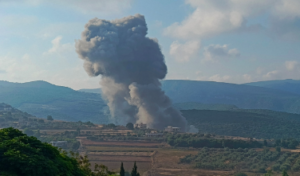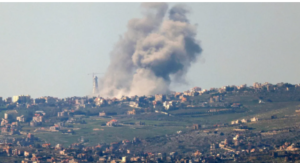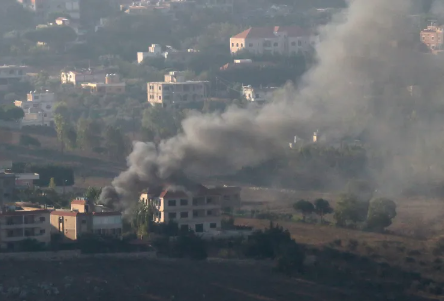In a powerful show of force, Israel has launched a series of extensive airstrikes on southern Lebanon, targeting more than 100 Hezbollah rocket launchers and other key “terrorist sites,” including a weapons storage facility. The Israel Defense Forces (IDF) reported that these launchers were poised to be fired against Israel, signaling a proactive approach to neutralize threats before they could materialize.
Strategic Strikes Amid Rising Hostilities
The recent strikes mark one of the most intense military operations by Israel since the escalation of hostilities in October 2023, following a brutal attack by Hamas militants. According to the IDF, this latest offensive is part of a broader strategy aimed at degrading Hezbollah’s military infrastructure and capabilities in order to safeguard Israel’s northern communities.

Lebanese state media reported that the strikes were met with a barrage of retaliatory attacks from Hezbollah, with the militant group firing anti-tank missiles and drones into northern Israel. The conflict has resulted in significant casualties, with hundreds of Hezbollah fighters killed and thousands of people displaced on both sides of the border since the skirmishes began
Hezbollah’s Defiant Response
In a televised address, Hezbollah leader Hassan Nasrallah condemned the Israeli strikes, accusing Israel of crossing all “red lines” and committing what he described as war crimes. He acknowledged the severe impact of the recent attacks on Hezbollah’s capabilities but maintained that the group’s command and communication structures remain intact. Nasrallah vowed that Hezbollah’s cross-border attacks would continue unless there is a ceasefire in Gaza, further escalating the already volatile situation
Strategic Implications and International Response
Israeli Defense Minister Yoav Gallant indicated that the IDF is entering a “new phase of the war,” focusing more efforts on the northern front. This shift comes amid concerns over a deteriorating security situation and aims to create a buffer zone inside southern Lebanon to protect Israeli territory. The IDF has urged residents near the Lebanese border to stay vigilant, avoid large gatherings, and remain close to bomb shelters as the situation remains unpredictable.
The international community has expressed deep concern over the potential for further escalation. U.S. Secretary of State Antony Blinken called for restraint from all parties, emphasizing the need to avoid actions that could hinder efforts to achieve a ceasefire in Gaza. Similarly, UK Foreign Secretary David Lammy called for an immediate ceasefire between Israel and Hezbollah, advocating for a political resolution that would allow civilians on both sides to return safely to their homes
Israel has intensified its military campaign in southern Lebanon, conducting airstrikes against over 100 Hezbollah targets, including rocket launchers and terrorist infrastructure, as part of its ongoing conflict with the Iran-backed group. The Israeli Defense Forces (IDF) claimed that the targeted rocket launchers were ready to be fired at Israel. The strikes also included hits on military buildings in the Jibbain area and other strategic locations like Halta and Kfarkela, causing significant destruction but with no immediate reports of casualties on the Lebanese side.
This escalation follows Hezbollah’s accusation that Israel crossed “all red lines” with sophisticated attacks earlier in the week, which involved simultaneous explosions of pagers and walkie-talkies across Lebanon, killing 37 and injuring over 3,000 people. Hezbollah leader Hassan Nasrallah described the attacks as a deliberate massacre, intended to kill thousands of people, and he vowed retaliation while acknowledging the technological superiority of Israel and its allies.

The conflict between Israel and Hezbollah, which began following the Hamas attacks on Israel in October 2023, has now reached a new phase, with both sides trading heavy fire. The IDF is also preparing for potential ground operations in northern Israel, while Israeli officials have hinted at the possibility of creating a buffer zone inside southern Lebanon to secure their northern communities. The situation has raised concerns of a broader regional conflict, prompting international calls for restraint and a ceasefire from figures like US Secretary of State Antony Blinken and UK Foreign Secretary David Lammy.
Lebanese and Israeli civilians continue to face a high level of threat, with displacement and disruptions in daily life being widespread on both sides of the border





